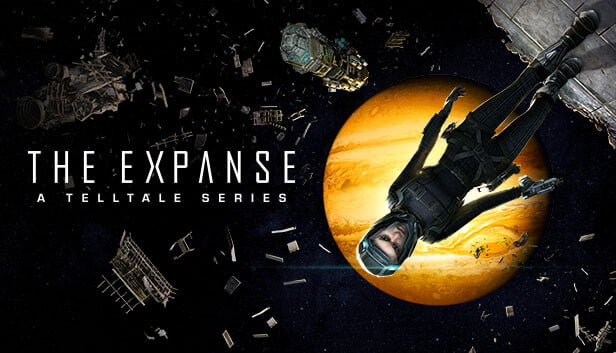
The Expanse- Game Review
Telltale Games is known for constantly riveting storylines, and their prequel to The Expanse is an excellent addition to their library. Camina Drummer, who viewers of the television series would remember, is our protagonist aboard The Artemis. But don’t worry, since this game is a prequel and can be played and enjoyed without prior knowledge of the programme. Meanwhile, pre-established characters Chrisjen Avasarala and Anderson Dawes are seamlessly weaved into the fabric of the game, with no unnecessary exposition. The narrative’s supporting characters are all fresh inventions for the game, and their flaws and peculiarities are beautifully given with life.
 Camina Drummer is the XO (second in command) of the starship Artemis, a salvage vessel looking for a huge payoff within our Solar System. The spacecraft and its seven-person crew are going for spaceship ruins in search of a hint that, according to the Captain, will lead to something extremely important. Unfortunately, a gang of violent pirates is also hunting for the same object and is willing to murder for it. Drummer will investigate spacecraft wreckage, rescue what she can, oversee her crew, evade pirates, and pursue a trail of clues that leads to a strange abandoned space station. But if the treasure turns out to be something unexpected, Drummer may have to reconsider his strategy.
Camina Drummer is the XO (second in command) of the starship Artemis, a salvage vessel looking for a huge payoff within our Solar System. The spacecraft and its seven-person crew are going for spaceship ruins in search of a hint that, according to the Captain, will lead to something extremely important. Unfortunately, a gang of violent pirates is also hunting for the same object and is willing to murder for it. Drummer will investigate spacecraft wreckage, rescue what she can, oversee her crew, evade pirates, and pursue a trail of clues that leads to a strange abandoned space station. But if the treasure turns out to be something unexpected, Drummer may have to reconsider his strategy.
 Newcomers will welcome her presence as well, but it may take some time for them to catch up on the rest of the plot. The Expanse doesn’t spend time introducing itself. It, like the programme it’s based on, throws you into the middle of a horrible scenario and expects you to figure out what’s going on on your own.
Newcomers will welcome her presence as well, but it may take some time for them to catch up on the rest of the plot. The Expanse doesn’t spend time introducing itself. It, like the programme it’s based on, throws you into the middle of a horrible scenario and expects you to figure out what’s going on on your own.
Taken on its own, The Expanse: A Telltale Series will most likely feel quite familiar to anyone who has played prior Telltale games or Deck Nine’s Life is Strange: True Colours. You wander about, chat to other people, and generally advance the story by seeking for items, finding them, and taking them somewhere else. The most noticeable difference between The Expanse: A Telltale Series and prior games in its genealogy is that it is set in space, therefore there is a lot of zero-g exploring. As Drummer, you can utilise thrusters to lift off the ground and float about to navigate, and you can use your mag boots to walk on walls, ceilings, and other non-gravitational surfaces.
 Wandering these settings, which are dark and gloomy, raises the hairs on the back of your neck since you never know what’s around the next corner. Exploration is thrilling, made even more so by the game’s zero-gravity features. You’re weighed down by magnetic boots, but with the push of your right trigger, you may fly away, allowing you unrestricted exploration. It can be a little tricky at times, but Camina controls extremely well for the most part, and the extra freedom you’re allowed adds a new layer to the experience.
Wandering these settings, which are dark and gloomy, raises the hairs on the back of your neck since you never know what’s around the next corner. Exploration is thrilling, made even more so by the game’s zero-gravity features. You’re weighed down by magnetic boots, but with the push of your right trigger, you may fly away, allowing you unrestricted exploration. It can be a little tricky at times, but Camina controls extremely well for the most part, and the extra freedom you’re allowed adds a new layer to the experience.
The landscapes of The Expanse become plausible and visceral thanks to slightly reacting detritus, graffiti, and communications records that recount The Belt’s geopolitical debate alongside recollections of Earth and Mars. The personalities of the characters are funnelled through passive speech and item descriptions, while hints of their personal storylines are wiped out by sluggish gameplay, which is luckily minimal.
 Violence abounds in both the game and the programme. It forms the skeleton of a world marred by intergalactic colonisation, inequity, and poverty.
Violence abounds in both the game and the programme. It forms the skeleton of a world marred by intergalactic colonisation, inequity, and poverty.
The characters’ face motion-capture and animations are without a doubt the game’s finest visual success. Previous Telltale games frequently struggled with face emotions, making characters rigid and odd. Deck Nine’s animations, on the other hand, are fluid and lifelike, with characters frequently exchanging knowing looks that leave you wondering what they’re thinking, or having little interactions with Drummer that include simply of body language and facial expressions.
 Other mechanisms that the game attempts to engage with are less successful. The fight is just a sequence of quicktime events in which you must press a succession of buttons depending on visual signals within a given time restriction. The time constraints are flexible enough that getting through them isn’t tough, and it’s pleasant to take a break from exploring, but anyone hoping for depth won’t find it.
Other mechanisms that the game attempts to engage with are less successful. The fight is just a sequence of quicktime events in which you must press a succession of buttons depending on visual signals within a given time restriction. The time constraints are flexible enough that getting through them isn’t tough, and it’s pleasant to take a break from exploring, but anyone hoping for depth won’t find it.
 In the studio’s extensive catalogue of narrative-driven games, The Expanse: A Telltale Series is a strong installment. Even with the majority of the usual cast members missing, the episodes have a fantastic visual aesthetic, and Cara Gee gives a fantastic performance as the lead character. Digging through the gloomy, deserted wreckages of spaceships and space stations has been the tale’s high point, despite how amazing and suspenseful the plot is overall. The Expanse: A Telltale Series offers a welcome diversion from the vast majority of role-playing games by demonstrating that sometimes, less really is more.
In the studio’s extensive catalogue of narrative-driven games, The Expanse: A Telltale Series is a strong installment. Even with the majority of the usual cast members missing, the episodes have a fantastic visual aesthetic, and Cara Gee gives a fantastic performance as the lead character. Digging through the gloomy, deserted wreckages of spaceships and space stations has been the tale’s high point, despite how amazing and suspenseful the plot is overall. The Expanse: A Telltale Series offers a welcome diversion from the vast majority of role-playing games by demonstrating that sometimes, less really is more.

